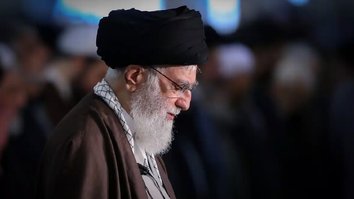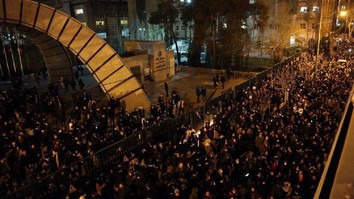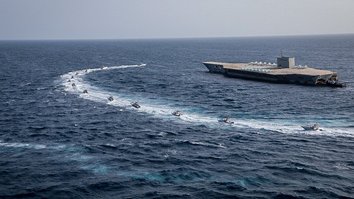KABUL -- Iran's initial bravado following a US drone strike that killed a top military commander in early January quickly fizzled out, exposing an undercurrent of impotence that threatens the stability of the regime.
The strike that killed Islamic Revolutionary Guard Corps (IRGC) Quds Force commander Maj. Gen. Qasem Soleimani in Baghdad on January 3 spurred numerous calls for bloody revenge.
Iranian Supreme Leader Ayatollah Ali Khamenei and President Hassan Rouhani warned of "severe revenge".
The Supreme National Security Council, Tehran's top security body, said the United States would "face severe vengeance... in the right place and time".
![Top Iranian military leaders appear disquieted at an event in Tehran on January 14. [Iranian Ministry of Defence]](/cnmi_st/images/2020/01/17/22010-iranmilitary-585_329.jpg)
Top Iranian military leaders appear disquieted at an event in Tehran on January 14. [Iranian Ministry of Defence]
![A picture posted on Telegram on January 13 shows a woman in Tehran openly criticising a member of the Iranian security services. [File]](/cnmi_st/images/2020/01/17/22008-tehranwoman-585_329.jpg)
A picture posted on Telegram on January 13 shows a woman in Tehran openly criticising a member of the Iranian security services. [File]
Tehran will "exact terrible vengeance upon America," Mohsen Rezai, former commander of the IRGC, now secretary of the country's Expediency Discernment Council, wrote on Twitter.
"Definitely there will be revenge, a harsh revenge," said Iranian Ambassador to the United Nations Takht Ravanchi.
Iranian army chief Maj. Gen. Abdolrahim Mousavi went so far as to say the United States lacked the "courage" to initiate a conflict.
Bluster
After all the dramatic rhetoric, the regime's "decisive response", as Rouhani termed it, came on January 8 when it fired 22 missiles on two bases housing US and other foreign troops in Iraq.
At the time, Iranian state media claimed that the barrage killed at least 80 American troops. However, US and Iraqi officials confirmed the absence of casualties.
In fact, the missiles caused only minimal material damage.
"Any new malicious act or movement of aggression will be met with even more painful and devastating responses," claimed the IRGC at the time.
But then IRGC leaders started to walk back on their previous braggadocio.
"Our aim was not really to kill enemy soldiers. That was not important," IRGC top commander Hossein Salami told parliament Sunday (January 12), referring to the January 8 missile operation.
"The physical destruction was just because we wanted to say that we are so much more superior to the enemy," he said in a speech aired on state television.
IRGC aerospace commander Brig. Gen. Amirali Hajizadeh reiterated that narrative.
"We did not intend to kill," he said according to Iranian state media.
'Exaggerating everything'
The need for Iranian leaders to go to such lengths to exaggerate the regime's capabilities and the timidity of the military's "terrible vengeance" have exposed major weaknesses of the clerical and military establishments.
"The military capabilities of the United States and Iran are absolutely incomparable," said Aziz Ahmad Wardak, a Kabul-based military analyst.
After Soleimani's death, Tehran boasted about its capabilities and said it would take harsh revenge and expel Americans from the region, he said.
"But to this day, it has neither taken harsh revenge nor forced Americans out of the region," Wardak said. "Such statements are meant only to intimidate regional countries."
"The Iranian military, especially the IRGC, is lying and exaggerating everything about itself," he said. "The truth is, Iran does not have the military and combat capabilities it claims."
The IRGC has "resorted to lying to control public opinion in the country", said Kabul-based military analyst Aziz Stanakzai.
Iranian leaders "have begun spreading propaganda through their media outlets, claiming that up to 80 Americans were killed in their missile attacks on US bases in Iraq", he said.
"Political and military officials of Iran had predicted the consequences of taking harsh revenge; therefore, they deliberately did not want to harm American forces in Iraq," he said.
"The Iranian government and its military know that they are not capable of confronting the world's most powerful military," he said.
'Death to the dictator'
The fragility of the regime has been further exposed by the wave of internal protests across the country.
Tens of thousands of Iranians took to the streets with renewed outrage over the weekend after the IRGC admitted to accidentally shooting down a Ukrainian passenger airliner January 8 in the midst of the turmoil. Protests have continued unabated.
The protesters shouted "Death to the dictator" -- a reference to Khamenei -- "Death to liars" and other anti-regime slogans.
Numerous videos posted on social media showed demonstrators calling for Khamenei to step down and for those responsible for downing the plane to be prosecuted.
"Khamenei, have shame. Leave the country," demonstrators chanted.
The Ukrainian airliner went down in the dark just minutes after takeoff -- and just hours after the Iranian regime launched its missile strikes in Iraq. All 176 passengers and crew were killed.
Despite video and circumstantial evidence pointing to a surface-to-air missile hitting the airliner, Tehran continued for days to deny that its own missile took down Ukraine International Airlines Flight PS752.
But faced with increasing international and internal pressure, Rouhani on January 11 finally admitted the truth -- that the Iranian military shot down the plane in a "catastrophic mistake".
On January 14 the judiciary announced the first arrests over the calamitous blunder, without specifying how many.
Some student protesters also called the IRGC "incompetent" and "the people's shame".
Faezeh Hashemi, a political activist, former parliamentarian and daughter of Ayatollah Akbar Hashemi Rafsanjani, a former Iranian president, spoke out in support of protesters.
In an audio recording broadcast by the BBC Persian service, she called for Khamenei to step down to allow structural changes to take place. She also encouraged the street protests to continue.
Former parliament speaker and top dissident politician Mehdi Karroubi also said Khamenei is "unqualified" to lead the country.
Khamenei has none of the qualifications stipulated in the Islamic Republic Constitution for the leadership of the country, Karroubi said in a bold letter addressing the supreme leader.
Khamenei was "directly responsible" for shooting down the Ukrainian airliner and killing everybody on board, added Karroubi.
"It is a shame that you were aware of the incident on Wednesday [January 8] and still allowed the military and civil authorities and the country's propaganda machine to deceive the people for three days," he said.
"It is also a shame if you were not aware of the disaster for two days," he said, referring to some media reports claiming that underlings notified Khamenei of the tragedy two days after it occurred.
[Sulaiman from Kabul contributed to this report.]







